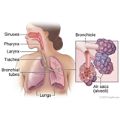Our Health Library information does not replace the advice of a doctor. Please be advised that this information is made available to assist our patients to learn more about their health. Our providers may not see and/or treat all topics found herein. The goal of surgery for lung cancer is to remove all of the cancer and a border of normal tissue (margin) around it. The type of surgery depends on the location and size of the tumor. Types of surgery include: During surgery, the doctor may also remove nearby lymph nodes to find out if the cancer has spread. Lung surgery may be done through one cut (incision) in the chest (thoracotomy). Or it may be done through several small cuts (video-assisted thoracic surgery, or VATS). Lung surgery requires you to stay in the hospital after the procedure. How long you stay will depend on: Pain is a common concern after this surgery. Depending on the type of surgery you have, your chest area may be painful for several weeks to months after surgery. Your doctor will prescribe pain medicines you can use for pain after the surgery. You can also talk to your doctor about things you can do at home to help ease pain. One or more chest tubes are used after surgery to drain your chest cavity of fluid and blood, which are present after lung surgery. The chest tubes also help your lungs refill with air. Chest tubes are placed in your chest cavity and extend out through your chest wall and skin through small cuts between your ribs on the same side as the surgery. The tubes are connected to a machine that creates a gentle suction, which helps your chest fluid to drain. The fluid is collected in a container that measures the amount of fluid draining from your chest. The chest tubes will be removed when the drainage from your chest has stopped and no air is leaking from your chest incision, which is usually after a few days. A respiratory therapist will help you with breathing treatments to improve your lung function after surgery. Treatments usually involve deep breathing and the use of a spirometer. Medicines may also be used to help open your airway and help you breathe more easily. A thoracotomy or video-assisted thoracic surgery (VATS) may be done to: Surgery is more effective in early-stage non-small cell lung cancer (NSCLC) when the lung cancer can be completely removed and the cancer has not spread to lymph nodes or outside the chest cavity. Surgery is sometimes used in limited-stage small cell lung cancer (SCLC), when there is a single tumor and the cancer has not spread to the lymph nodes. But small cell lung cancers are not often diagnosed at this early stage. Minimally invasive lung surgeries like video-assisted thoracoscopic surgery (VATS) work as well as open-chest surgery (thoracotomy) for cancer treatment. Lung surgery risks include: Current as of: September 29, 2025 Author: Ignite Healthwise, LLC Staff Current as of: September 29, 2025 Author: Ignite Healthwise, LLC Staff Clinical Review Board This information does not replace the advice of a doctor. Ignite Healthwise, LLC disclaims any warranty or liability for your use of this information. Your use of this information means that you agree to the Terms of Use and Privacy Policy. Learn how we develop our content. To learn more about Ignite Healthwise, LLC, visit webmdignite.com. © 2024-2025 Ignite Healthwise, LLC.Topic Contents
Lung Surgery for Lung Cancer
What To Expect
Pain
Chest tubes
Respiratory treatments
Why It Is Done
How Well It Works
Risks
Credits
Clinical Review Board
All Ignite Healthwise, LLC education is reviewed by a team that includes physicians, nurses, advanced practitioners, registered dieticians, and other healthcare professionals.
All Ignite Healthwise, LLC education is reviewed by a team that includes physicians, nurses, advanced practitioners, registered dieticians, and other healthcare professionals.
Our Health Library information does not replace the advice of a doctor. Please be advised that this information is made available to assist our patients to learn more about their health. Our providers may not see and/or treat all topics found herein. Current as of: September 29, 2025 Author: Ignite Healthwise, LLC Staff Clinical Review BoardLung Surgery for Lung Cancer
All Ignite Healthwise, LLC education is reviewed by a team that includes physicians, nurses, advanced practitioners, registered dieticians, and other healthcare professionals.





